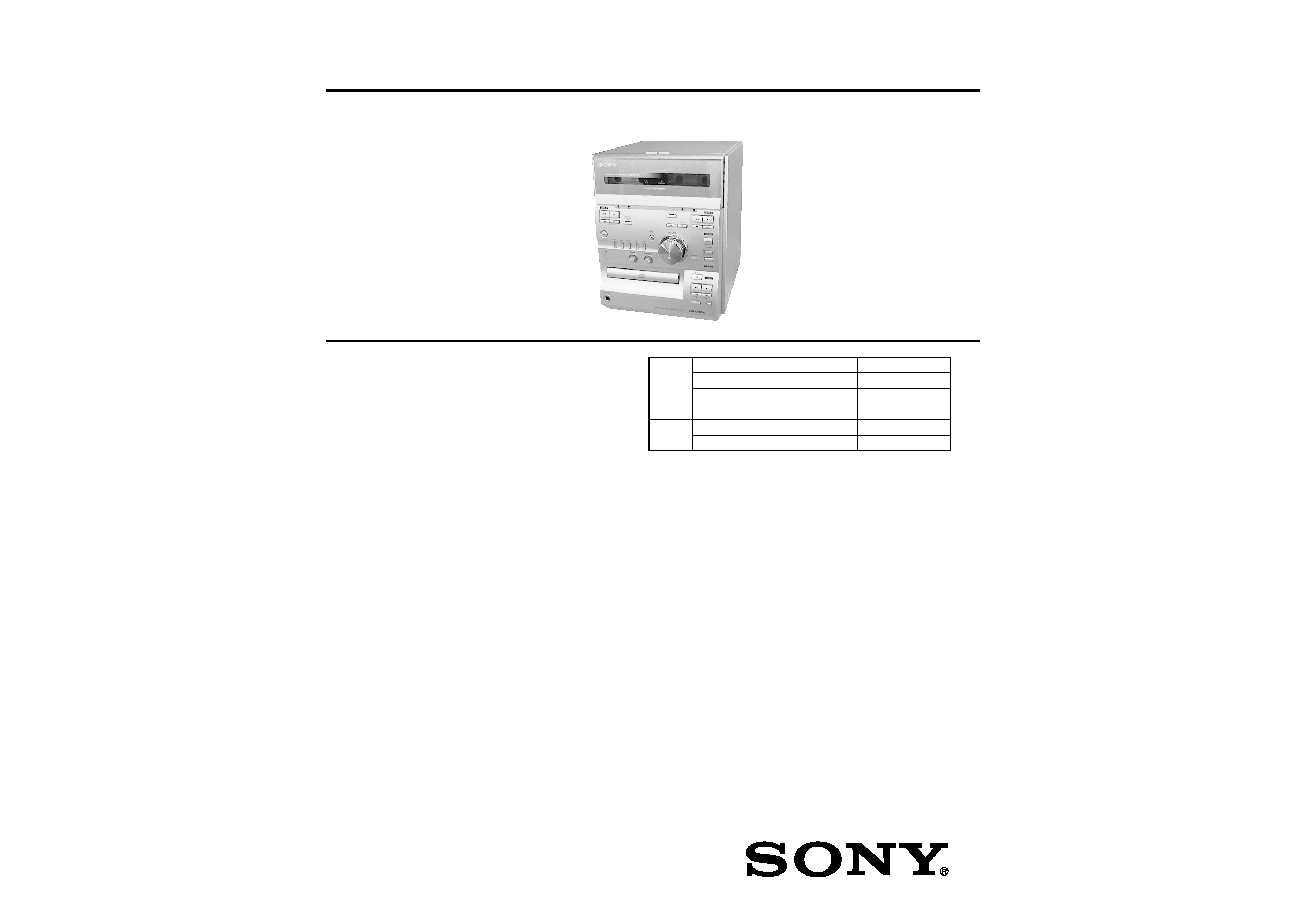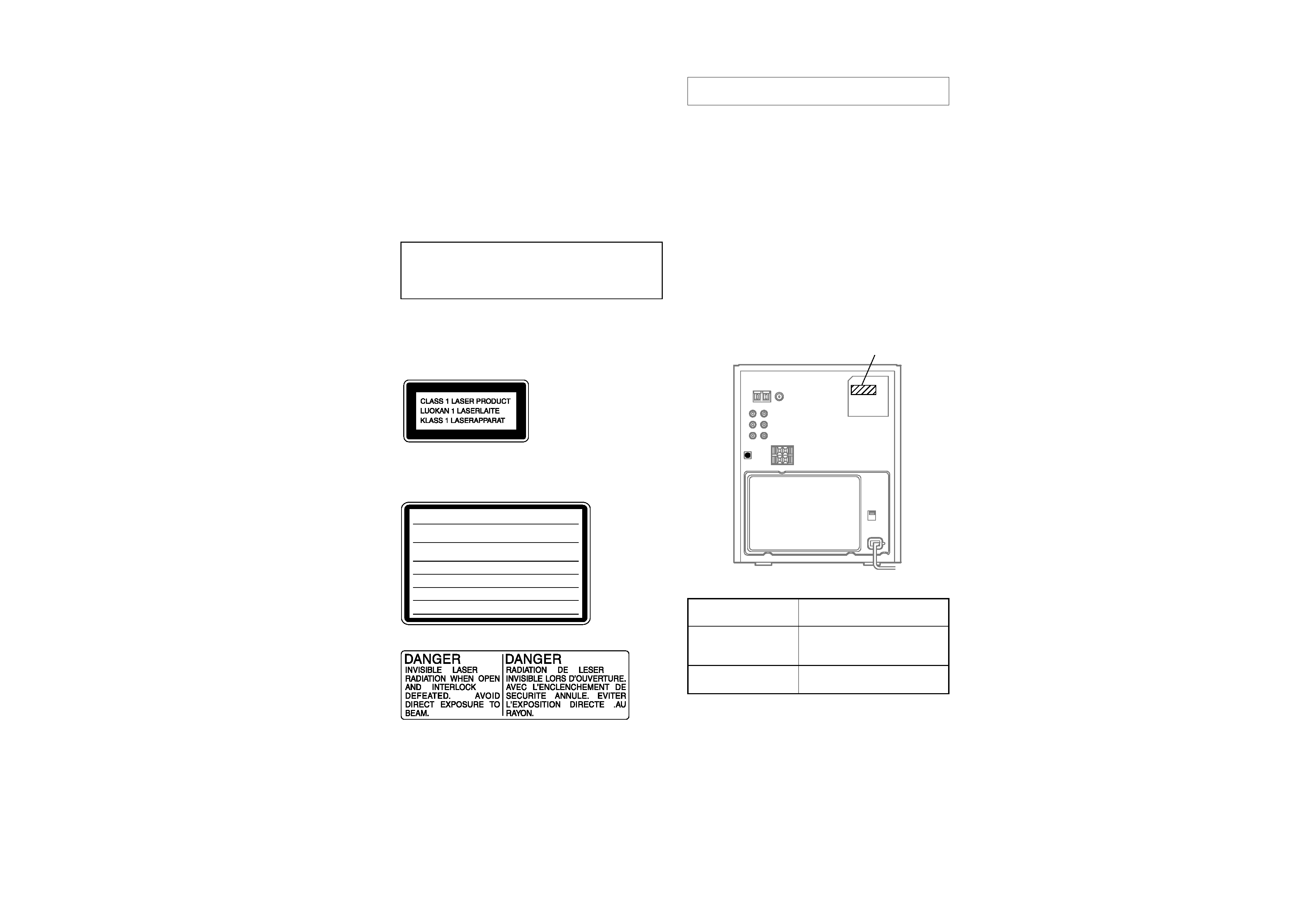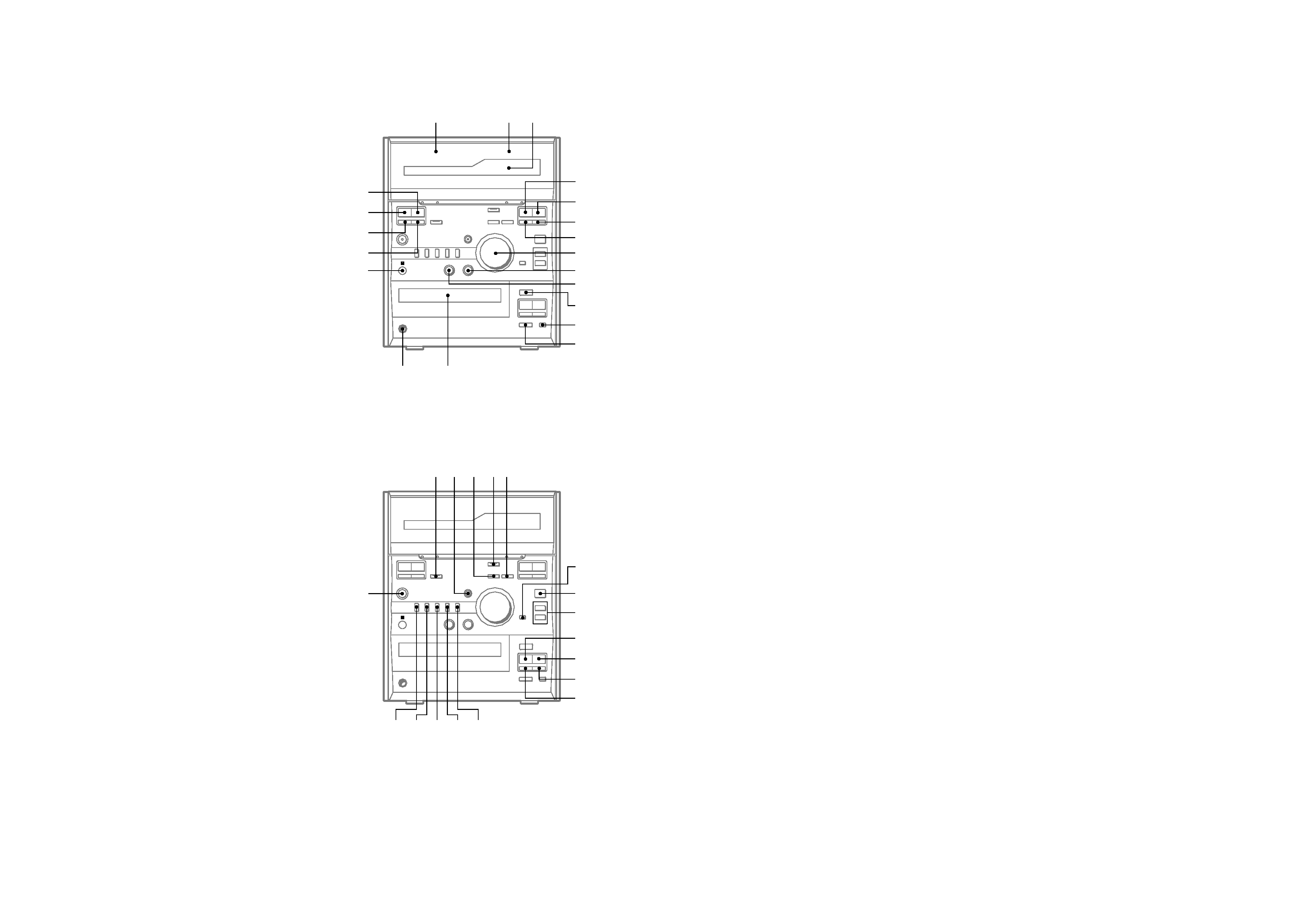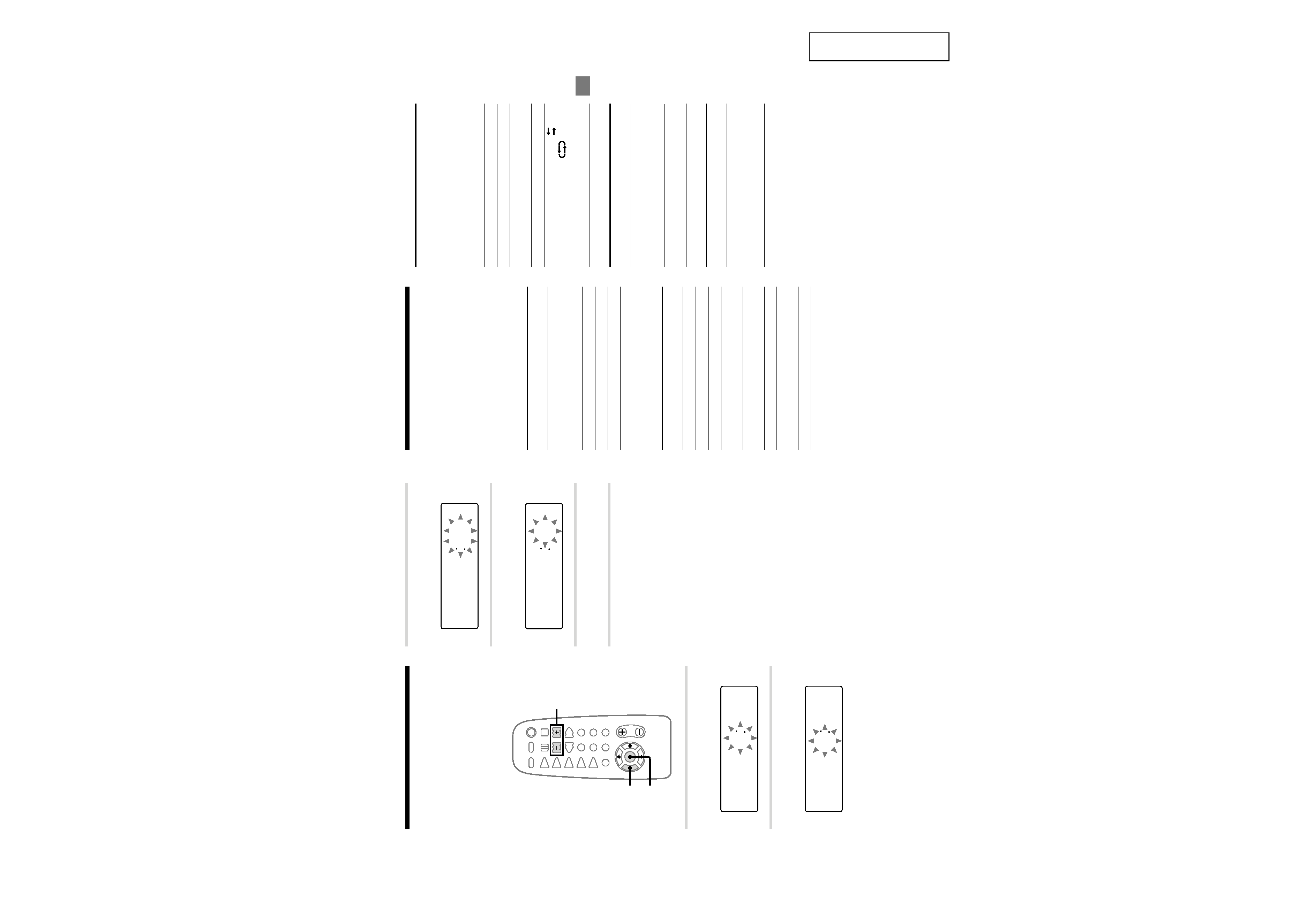
SERVICE MANUAL
CD player section
System
Compact disc and digital audio
system
Laser
Semiconductor laser
(
= 780 nm)
Emission duration: continuous
Laser output
MAX 44.6
µW*
* This output is the value
measured at a distance of
200 mm from the objective
lens surface on the Optical
Pick-up Block with 7 mm
aperture.
Wavelength
780 - 790 nm
Frequency response
20 Hz - 20 kHz (
±0.5 dB)
Tape player section
Recording system
4-track 2-channel stereo
Frequency response (DOLBY NR OFF)
50 - 13,000 Hz (
±3 dB), using a
Sony TYPE I cassette
50 - 14,000 Hz (
±3 dB),
using a Sony TYPE II cassette
Amplifier
section
European and Australian models:
DIN power output (rated):
30 + 30 W
(6 ohms at 1 kHz, DIN)
Continuous RMS power output (reference):
35 + 35 W
(6 ohms at 1 kHz, 10% THD)
Music power output (reference):
130 W
Other models:
The following measured at 230 V AC, 60 Hz
DIN power output (rated):
30 + 30 W
(6 ohms at 1 kHz, DIN)
Continuous RMS power output (reference):
35 + 35 W
(6 ohms at 1 kHz, 10% THD)
The following measured at 220 V AC, 60 Hz
DIN power output (rated):
28 + 28 W
(6 ohms at 1 kHz, DIN)
Continuous RMS power output (reference):
33 + 33 W
(6 ohms at 1 kHz, 10% THD)
Inputs
MD IN (phono jacks):
Sensitivity 500 mV, impedance
47 kilohms
VIDEO IN (phono jacks): Sensitivity 250 mV, impedance
47 kilohms
Outputs
LINE OUT (phono jacks): Sensitivity 250 mV, impedance
1 kilohm
OPTICAL DIGITAL OUT CD:
Optical
PHONES (stereo phone jack):
Accepts headphones with an
impedance of 8 ohms or more
SPEAKER:
Active speaker system, 6 ohms
COMPACT DISC DECK RECEIVER
SPECIFICATIONS
HCD-CP2A
Dolby noise reduction manufactured under license
from Dolby Laboratories Licensing Corporation.
"DOLBY" and the double-D symbol ; are trade-
marks of Dolby Laboratories Licensing Corporation.
AEP Model
UK Model
E Model
Australian Model
HCD-CP2A is the Amplifier, CD player,
Tape Deck and Tuner section in
CMT-CP2WA.
Continued on next page
Model Name Using Similar Mechanism
NEW
CD
CD Mechanism Type
CDM55D-K5BD41
Section
Base Unit Name
BU-K5BD41
Optical Pick-up Name
KSM-213CKP/K1N
TAPE
Model Name Using Similar Mechanism
NEW
Section
Tape Transport Mechanism Type
CMBL6Z112

2
SAFETY-RELATED COMPONENT WARNING!!
COMPONENTS IDENTIFIED BY MARK 0 OR DOTTED
LINE WITH MARK 0 ON THE SCHEMATIC DIAGRAMS
AND IN THE PARTS LIST ARE CRITICAL TO SAFE
OPERATION. REPLACE THESE COMPONENTS WITH
SONY PARTS WHOSE PART NUMBERS APPEAR AS
SHOWN IN THIS MANUAL OR IN SUPPLEMENTS PUB-
LISHED BY SONY.
TABLE OF CONTENTS
1.
SERVICING NOTES ............................................... 3
2.
GENERAL
Location of Controls .......................................................
4
Setting the Time ..............................................................
5
Parts Identification for the Remote .................................
5
3.
DISASSEMBLY ......................................................... 6
4.
TEST MODE .............................................................. 10
5.
MECHANICAL ADJUSTMENTS ....................... 11
6.
ELECTRICAL ADJUSTMENTS
Tape Deck Section .......................................................... 11
CD Section ...................................................................... 14
7.
DIAGRAMS
7-1. Note for Printed Wiring Boards and
Schematic Diagrams ....................................................... 15
7-2. Printed Wiring Board CD Board .............................. 16
7-3. Schematic Diagram CD Section ............................... 17
7-4. Printed Wiring Board TC Board ............................... 18
7-5. Schematic Diagram TC Section ............................... 19
7-6. Schematic Diagram MAIN Section (1/3) ................. 20
7-7. Schematic Diagram MAIN Section (2/3) ................. 21
7-8. Schematic Diagram MAIN Section (3/3) ................. 22
7-9. Printed Wiring Board MAIN Board ......................... 23
7-10. Printed Wiring Board LOADING Board .................. 24
7-11. Printed Wiring Board LCD Board ............................ 24
7-12. Printed Wiring Boards
AMP/HEADPHONE Boards .................................... 24
7-13. Schematic Diagram AMP Section ............................ 25
7-14. Printed Wiring Board CONTROL Board ................. 26
7-15. Schematic Diagram CONTROL Section .................. 27
7-16. Printed Wiring Board POWER Board ...................... 28
7-17. Schematic Diagram POWER Section ...................... 28
7-18. IC Pin Function Description ........................................... 35
8.
EXPLODED VIEWS ................................................ 38
9.
ELECTRICAL PARTS LIST ............................... 43
Tuner section
FM stereo, FM/AM superheterodyne tuner
FM tuner section
Tuning range
87.5 - 108.0 MHz
(50-kHz step)
Antenna
FM wire antenna
Antenna terminals
75 ohm unbalanced
Intermediate frequency
10.7 MHz
AM tuner section
Tuning range
European and Australian models:
531 - 1,602 kHz
(with the tuning interval set at
9 kHz)
Other models:
530 - 1,710 kHz
(with the tuning interval set at
10 kHz)
531 - 1,602 kHz
(with the tuning interval set at
9 kHz)
Antenna
AM loop antenna, external antenna
terminal
Intermediate frequency
450 kHz
General
Power requirements
European and Australian models:
230 V AC, 50/60 Hz
Other models:
110 - 120 V or 220 - 240 V AC ,
50/60 Hz
Adjustable with voltage selector
Power consumption
70 W
Dimensions (w/h/d)
Approx. 225
× 273 × 337 mm
(8 7/8
× 10 3/4 × 13 3/8 in) incl.
projecting parts and controls
Mass
Approx. 6.7 kg
(14 lb 12 oz)
Design and specifications are subject to change
without notice.

3
SECTION 1
SERVICING NOTES
The laser diode in the optical pick-up block may suffer electro-
static break-down because of the potential difference generated
by the charged electrostatic load, etc. on clothing and the human
body.
During repair, pay attention to electrostatic break-down and also
use the procedure in the printed matter which is included in the
repair parts.
The flexible board is easily damaged and should be handled with
care.
NOTES ON LASER DIODE EMISSION CHECK
The laser beam on this model is concentrated so as to be focused
on the disc reflective surface by the objective lens in the optical
pick-up block. Therefore, when checking the laser diode emis-
sion, observe from more than 30 cm away from the objective lens.
NOTES ON HANDLING THE OPTICAL PICK-UP
BLOCK OR BASE UNIT
CAUTION
Use of controls or adjustments or performance of procedures
other than those specified herein may result in hazardous ra-
diation exposure.
This appliance is classified as a CLASS 1 LASER product.
The CLASS 1 LASER PRODUCT MARKING is located on
the rear exterior.
Laser component in this product is capable of emitting radiation
exceeding the limit for Class 1.
The following caution label is located inside the unit.
CAUTION
: INVISIBLE LASER RADIATION WHEN OPEN AND
INTERLOCKS DEFEATED.
AVOID EXPOSURE TO BEAM.
ADVARSEL : USYNLIG LASERSTRÅLING VED ÅBNING NÅR
SIKKERHEDSAFBRYDERE ER UDE AF FUNKTION. UNDGÅ UDSAETTELSE
FOR STRÅLING.
VORSICHT : UNSICHTBARE LASERSTRAHLUNG, WENN
ABDECKUNG GEÖFFNET UND SICHEREITSVERRIEGELUNG
ÜBERBRÜCKT. NICHT DEM STRAHL AUSSETZEN.
VARO!
: AVATTAESSA JA SUOJALUKITUS OHITETTAESSA OLET ALT-
TIINA NÄKYMÄTTÖMÄLLE LASERSÄTEILYLLE. ÄLÄ KATSO SÄTEESEEN.
VARNING
: OSYNLING LASERSTRÅLING NÄR DENNA DEL ÄR ÖPPNAD
OCH SPÄRREN ÄR URKOPPLAD. BETRAKTA EJ STRÅLEN.
ADVERSEL : USYNLIG LASERSTRÅLING NÅR DEKSEL ÅPNES OG
SIKKERHEDSLÅS BRYTES. UNNGÅ EKSPONERING FOR STRÅLEN.
VIGYAZAT! : A BURKOLAT NYITÁSAKOR LÁTHATATLAN LÉZERSU-
GÁRVESZÉLY! KERÜLJE A BESUGÁRZÁST!
· MODEL IDENTIFICATION
Rear Panel
Model
Power Voltage Indication
AEP, UK,
North European and
AC: 230 V -50/60 Hz 70 W
Australian models
Saudi Arabia
AC: 110 120/220 240 V
-50/60 Hz 70 W
Power Voltage Indication
Notes on chip component replacement
· Never reuse a disconnected chip component.
· Notice that the minus side of a tantalum capacitor may be dam-
aged by heat.
Flexible Circuit Board Repairing
· Keep the temperature of the soldering iron around 270 °C dur-
ing repairing.
· Do not touch the soldering iron on the same conductor of the
circuit board (within 3 times).
· Be careful not to apply force on the conductor when soldering
or unsoldering.

4
bB
x
mM
bB
x
mM
x
.>
Xz
u
+
Z
m
M
12
3
4
5
6
7
8
9
q;
qa
qs
qd
w;
ql
qk
qj
qh
qg
qf
bB
x
mM
bB
x
mM
x
.>
Xz
u
+
Z
m
M
wa ws
wd
wf wg
wh
wj
wk
wl
e;
ea
es
ed
ek
ej
eh
eg
ef
SECTION 2
GENERAL
· LOCATION OF CONTROLS
Front View
1 TAPE A deck
2 TAPE B deck
3 Liquid crystal display
4 TAPE B Y button
5 TAPE B x button
6 TAPE B M button
7 TAPE B m button
8 VOLUME knob
9 TREBLE knob
0 BASS knob
qa CD EJECT Z button
qs CD REPEAT button
qd CD PLAY MODE button
qf TAPE A x button
qg TAPE A Y button
qh TAPE A m button
qj TAPE A M button
qk Remote control sensor
ql PHONES jack
w; CD disc tray
wa HI-SPEED DUBBING A
tB button and indicator
ws DSG button and indicator
wd
X button (TAPE A/B)
wf CD SYNC button and indicator
wg REC button
wh TUNING MODE button
wj TUNER BAND button
wk TUNING +/ buttons
wl CD u button
e; CD x button
ea
> M button
es
. m button
ed
I/1 button and indicator
ef VIDEO button and indicator
eg MD button and indicator
eh TAPE button and indicator
ej CD button and indicator
ek TUNER button and indicator

5
This
section
is
e
xtr
acted
from
instruction
manual.
6
Step 2: Setting the time
Before you can use the system's timer functions,
set the internal clock.
The clock uses a 24-hour system on the European
model, and a 12-hour system on other models.
The 24-hour system is used here for illustration
purposes.
3,5
1
2,4
1 Press TIMER SET.
The hour indication flashes.
000
2 Press l/L repeatedly to set the
hour.
1300
3 Press ENTER.
The minute indication flashes.
1300
4 Press l/L repeatedly to set the
minute.
1310
5 Press ENTER.
The clock starts working.
To reset the system clock
You can reset the system clock when the system is
on.
1 Press TIMER SET.
2 Press l/L repeatedly until
"SET CLOCK" appears, then press ENTER.
3 Repeat step 2 to 5 in "Step 2: Setting the time".
Tip
If you make a mistake, start over from step 1.
33
Additional
Information
Parts identification for
the remote
You can also operate the system with the supplied
remote.
Buttons marked with "*" are provided only on the
remote.
TUNER
Remote
Button(s)
Function
TUNER/BAND
Selects FM or AM.
CD
Remote
Button(s)
Function
CD H
s
Stops playback.
S
Pauses playback.
l/L
Selects a track (AMS: Automatic
Music Sensor).
j/J
Locates a desired point in a
track.
CD REPEAT
Repeats playback.
TAPE
Remote
Button(s)
For operating
the
Function
TAPE A (or B)
nN
Deck A or B
Starts playback.
Each time you
press this button,
the tape reverses
direction.
s
Deck A or B
Stops playback.
S
Deck A or B
Pauses playback.
j/J
Deck A or B
Fast-forwards or
rewinds.
z REC
Deck B
Records to tapes.
Remote
Button(s)
Function
?/1
Turns on or off the system.
VOL +/
Adjusts the volume.
FUNCTION
Selects the source.
TUNING MODE
Selects "AUTO", "PRESET" or
"MANUAL".
MEMORY*
Presets a station.
STEREO/MONO* Selects "STEREO" or "MONO".
l/L
Selects a preset number.
j/J
Scans for a station or selects a
preset station.
Starts playback.
PLAY MODE
Selects Shuffle, Program or
Normal Play.
DISPLAY*
Changes the front panel display.
DIR MODE*
Deck A or B
Selects "
",
"
" or "R".
DOLBY NR* Deck A or B
Turns on or off the
Dolby NR system.
TIMER
Remote
Button(s)
Function
SLEEP*
Selects a sleep time.
TIMER SET*
Sets the time, Daily Timer or
REC Timer.
TIMER SELECT* Checks the settings and turns on
or off the timer.
OTHERS
DSG
Generates a more dynamic
sound.
